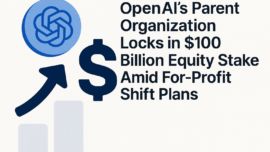In a significant shift towards profitability, OpenAI announced that it has secured a $100 billion equity stake for its controlling nonprofit organization, reflecting a broader transition into a public benefit corporation. This move aims to redefine OpenAI’s operational model while addressing ongoing financial negotiations with its primary partner, Microsoft.
Short Summary:
- OpenAI will provide its nonprofit parent organization with a $100 billion equity stake.
- The company plans to transition to a public benefit corporation, raising concerns over governance and mission alignment.
- Microsoft has renegotiated terms on its substantial investments with OpenAI, providing a clearer path for the future of both entities.
OpenAI’s recent announcement marks a pivotal moment as the organization gears up for a vital restructuring intended to boost its for-profit capabilities while maintaining its nonprofit roots. This shift comes amidst mounting regulatory scrutiny and internal discussions regarding the direction of artificial intelligence (AI) developments.
As is reported in the New York Times, the equity allocation to the nonprofit entity is set to exceed 20% in the restructured organization. OpenAI’s chairman, Bret Taylor, stated,
“This restructuring will empower our nonprofit to become one of the most well-resourced philanthropic organizations globally.”
The current plan indicates that this reallocation will enable OpenAI to further its mission while simplifying its financial model, particularly vital as AI’s influence continues to surge.
Since its inception in 2015, OpenAI operated primarily as a nonprofit, focusing on the mission of ensuring AI benefits humanity. Yet, with the advent of products like ChatGPT, launched in late 2022, OpenAI’s valuation soared from $14 billion in 2021 to a staggering $150 billion as of now. The organization had pivoted towards a capped-profit model in 2019, allowing it to access substantial investment from Microsoft, which totalled over $13 billion.
The evolving relationship with Microsoft has been fundamental in shaping OpenAI’s strategic direction. Under the initial agreement, Microsoft acquired around 49% of the future profits of OpenAI, a deal that some analysts argue has complicated OpenAI’s nonprofit objectives. Microsoft’s recent endorsement of OpenAI’s restructuring signals a newfound alignment as both entities work within the dual context of profit-making and public benefit.
In a joint statement, OpenAI and Microsoft confirmed the establishment of a non-binding memorandum, stating,
“We are dedicated to finalizing contractual terms in a definitive agreement that will further enhance our partnership and technological developments.”
This collaborative effort intends to solidify a robust framework for future innovations, including the handling of AI technologies deemed at risk of achieving artificial general intelligence (A.G.I.).
Critics of OpenAI’s strategic pivot have emerged, cautioning that the transition to a public benefit corporation could undermine earlier commitments made by the organization. Prominent figures in the AI community, including Elon Musk, have expressed trepidations that the focus on operational profitability will overshadow ethical considerations and the overarching mission to prioritize safe and beneficial AI. Concerns have arisen that OpenAI might forsake its foundational ethos, which emphasized safety and broad benefits over sheer financial performance.
The modifications to OpenAI’s governance structure also signify a departure from previous commitments to ensure that profit motives remain secondary to societal benefit. Initially, the organization was built on a model that capped profits for investors and redirected proceeds back to the nonprofit initiative. This structure was lauded as a means of aligning financial incentives with humanitarian objectives.
However, reports have surfaced suggesting that profit caps may be entirely removed, allowing exponential growth in returns for investors. According to financial analyses, the current trajectory of these caps—including the possibility that they could increase by 20% annually—could render previous restrictions effectively obsolete, ultimately aligning closer to traditional corporate profit motives.
Aside from financial restructuring, OpenAI’s leadership dynamics are also undergoing changes. Following the abrupt departure of chief technology officer Mira Murati, new board member appointments have been made, introducing a range of executives who are tasked with steering the organization toward its revised goals. This shakeup occurs against a backdrop of leadership challenges and a heightened need for coherence in governance…
OpenAI’s historical commitment to a nonprofit model has come into question, particularly following recent workforce dynamics that could be reflected in future directions. The decision-making power of the nonprofit board is expected to diminish as the organization reconfigures into a public benefit corporation, effectively changing the calculations about accountability and ethical imperatives that guided its earlier structures.
Furthermore, the prospect of OpenAI transitioning into a public benefit corporation, a category that uncouples strict obligations to prioritize public welfare, raises pressing questions about the implications for AI safety. As it stands, the evolving narrative mirrors various other tech giants’ trajectories, prompting wider discussions about ethical ramifications and stakeholder responsibilities within AI development.
As OpenAI moves forward, it’s apparent that intertwining ethical governance with profitability will require vigilant oversight. The impending changes outline a critical juncture in the development of AI and the extent to which it benefits the broader public. Maintaining a balance between profit and purpose will be paramount as the organization continues down this uncharted path.
Readers interested in keeping up with such pivotal developments in AI are encouraged to explore more at Autoblogging.ai for comprehensive insights into the future of technology and its intersection with ethics and society.
Do you need SEO Optimized AI Articles?
Autoblogging.ai is built by SEOs, for SEOs!
Get 30 article credits!


